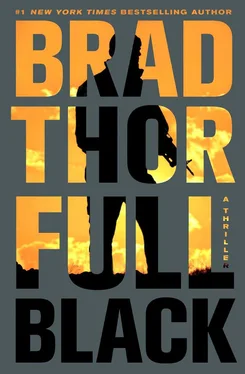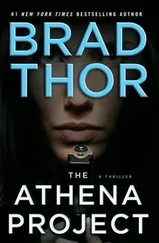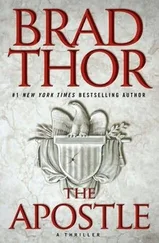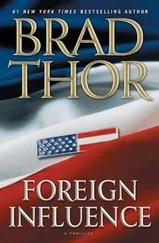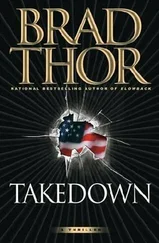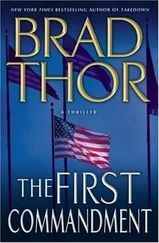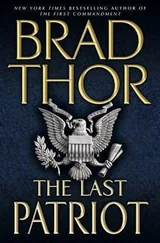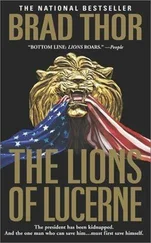Brad Thor - Full Black
Здесь есть возможность читать онлайн «Brad Thor - Full Black» весь текст электронной книги совершенно бесплатно (целиком полную версию без сокращений). В некоторых случаях можно слушать аудио, скачать через торрент в формате fb2 и присутствует краткое содержание. Жанр: Триллер, на английском языке. Описание произведения, (предисловие) а так же отзывы посетителей доступны на портале библиотеки ЛибКат.
- Название:Full Black
- Автор:
- Жанр:
- Год:неизвестен
- ISBN:нет данных
- Рейтинг книги:5 / 5. Голосов: 1
-
Избранное:Добавить в избранное
- Отзывы:
-
Ваша оценка:
- 100
- 1
- 2
- 3
- 4
- 5
Full Black: краткое содержание, описание и аннотация
Предлагаем к чтению аннотацию, описание, краткое содержание или предисловие (зависит от того, что написал сам автор книги «Full Black»). Если вы не нашли необходимую информацию о книге — напишите в комментариях, мы постараемся отыскать её.
Full Black — читать онлайн бесплатно полную книгу (весь текст) целиком
Ниже представлен текст книги, разбитый по страницам. Система сохранения места последней прочитанной страницы, позволяет с удобством читать онлайн бесплатно книгу «Full Black», без необходимости каждый раз заново искать на чём Вы остановились. Поставьте закладку, и сможете в любой момент перейти на страницу, на которой закончили чтение.
Интервал:
Закладка:
Frustrated with the CIA’s reluctance to do its job, the Department of Defense eventually turned to Carlton to provide private intelligence services in Iraq and Afghanistan. The group’s operatives had performed dramatically, developing extensive human networks across both countries. They penetrated multiple terrorist cells and delivered exceptional, A1 intelligence that resulted in huge successes for American forces, not to mention the saving of countless American and coalition lives.
Based upon this success, a key group of DoD insiders decided to bring the Carlton Group all the way inside. They were paid from black budgets and hidden from D.C.’s grandstanding, self-serving politicians. The fact that not one single Central Intelligence Agency employee had lost his or her job after 9/11 told the Pentagon all they needed to know about the broken culture at Langley.
The Carlton Group’s mission statement was a testament to their singular focus and consisted of only three simple yet powerful words: find, fix, and finish.
An exceptional judge of talent, Reed Carlton had studied Harvath for some time before making his first approach. Harvath’s background and abilities were a perfect fit for the private intelligence service Carlton had begun to build.
Originally a member of SEAL Team 2, Harvath’s language proficiency and desire for more challenging assignments had gotten him recruited to the storied SEAL Team 6. While with Team 6, he caught the eye of the Secret Service and was asked to come help bolster counterterrorism operations at the White House.
Having been trained to take the fight to the enemy, Harvath didn’t do well in a defensive role with the Secret Service. Waiting for bad guys to strike was just not his thing. What’s more, he lacked diplomacy-a prerequisite when working around politicians. As a result, Harvath pissed a lot of people off, some of them very powerful.
The one person he had managed to keep in his corner was the then-president of the United States, Jack Rutledge. Recognizing that America was faced with a fanatical enemy who refused to play by any rules, Rutledge had taken a significant step toward tilting the playing field back to America’s advantage. In short, he had set Harvath loose.
The clandestine program the president had established worked exceedingly well. Harvath did overwhelming damage to the enemies of the United States and continued to do so right up until the end of Rutledge’s second term, whereupon a new president entered the Oval Office with a different approach to dealing with America’s enemies.
Direct action, political speak for wet work, was replaced with engagement, diplomatic speak for capitulation, and Harvath found himself out of a job. As many men of his background do, he moved into the private sector. It wasn’t the same, and though Harvath told himself he was still doing good for his country, he was disappointed with the job opportunities. It was then that Reed Carlton had come into his life and had made him an offer he couldn’t refuse.
Within twelve months, the “Old Man,” as Harvath affectionately referred to Carlton, had drilled thirty years of tradecraft and hard-won espionage experience into him. He had also smoothed out many of his rough edges.
Combined with the deadly skills Harvath had acquired as a SEAL and the exceptional things he had learned in the Secret Service, Harvath’s training at the hands of Carlton vaulted him to the top of a very exclusive food chain. He had reached a level many seek, but few ever achieve. He had become an Apex Predator.
The Old Man made the resources available and turned Harvath loose with a simple three-word mandate-find, fix, finish. His job was to identify terrorist leaders, track them to a fixed location, and then capture or kill them as necessary, using any information gleaned from the assignment to plan the next operation. The goal was to apply constant pressure on the terrorists and pound them so hard and so relentlessly that they were permanently rocked back on the defensive, if not ground into dust.
In addition to direct-action assignments, Harvath was allowed to stage psychological operations to eat away at the terrorist networks from within, sowing doubt, fear, distrust, and paranoia throughout their ranks. It was everything the United States government should have been doing, but wasn’t. At least, it hadn’t been until the Carlton Group came on board.
Looking at his watch, Harvath decided Mansoor Aleem had been marinating long enough. It was time to begin the interrogation.
CHAPTER 8
The best interrogators knew that the most effective tool at their disposal was time. Left alone long enough, a prisoner’s mind would do half an interrogator’s work for him, if not more. No matter what horrors you could conceive of inflicting on a prisoner, the prisoner himself would always conceive of much worse. That was why Harvath liked to leave his interrogation subjects isolated and alone for as long as possible.
Interrogation was a delicate art. The key was getting the subject to tell you what you wanted to know, not what he thought you wanted to hear. A good interrogator operated like a surgeon; he wielded a scalpel, not a machete.
Only amateurs and the incredibly desperate actually resorted to true torture. And true torture was not turning up the air-conditioning, putting a subject in a stress posture, shaking him by his shirtfront, or giving him an open-handed slap across the face. Those were harsh interrogation techniques. They were not torture. Harvath knew the difference. He had used harsh interrogation techniques. He had also used torture.
And while he had never taken pleasure in it, it wasn’t something he had a moral problem with.
Torture was something he had used only as an absolute last resort. He loved to hear TV pundits and others cite the Geneva and Hague conventions. Putting aside the fact that most of them had never read any of those treaties, the key fact that they all missed was that America’s Islamist enemies were not a party to these agreements. What’s more, the conventions strictly forbade combatants from hiding and attacking from within civilian populations. Lawful combatants were also required to appear on the battlefield wearing something, whether a uniform or even just an armband, identifying them as combatants-overgrown beards and high-water pants didn’t count.
The long and short of it was that if one party refused to sign on and follow the rules, it couldn’t expect any sort of protection from those rules. And as far as Harvath was concerned, those who championed the extension of Geneva and Hague to Islamic terrorists were uninformed at best and apologists for terrorists at worst. Believing his country to be made up of good, reasonable people, he preferred to put the terrorist protectors in the former category.
Harvath never allowed himself to underestimate the capabilities or determination of America’s enemies. He had looked directly into the eyes of some of the most capable warriors Islam had dispatched, and he saw not only the depth of their conviction, but also the depth of their hate for the West and everything it stood for. There would be no truce with Islam. And while there were indeed good, decent Muslim people around the world, there were not enough of them. They lacked the collective will and desire to not only stand up to the violence being carried out in their name, but to reform the very tenets of their religion that called for that violence.
This was not how Harvath wished the world to be, but the world cared little for what he wanted. It was what it was. Harvath had shouldered a Herculean burden on behalf of his country so that it might remain free and unmolested. Though many others were also responsible for the fact that America remained free, Harvath found particular shame in the fact that it had not remained unmolested.
Читать дальшеИнтервал:
Закладка:
Похожие книги на «Full Black»
Представляем Вашему вниманию похожие книги на «Full Black» списком для выбора. Мы отобрали схожую по названию и смыслу литературу в надежде предоставить читателям больше вариантов отыскать новые, интересные, ещё непрочитанные произведения.
Обсуждение, отзывы о книге «Full Black» и просто собственные мнения читателей. Оставьте ваши комментарии, напишите, что Вы думаете о произведении, его смысле или главных героях. Укажите что конкретно понравилось, а что нет, и почему Вы так считаете.
